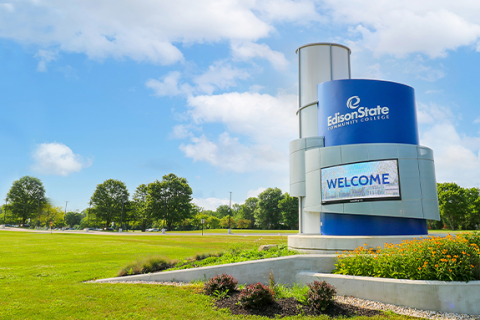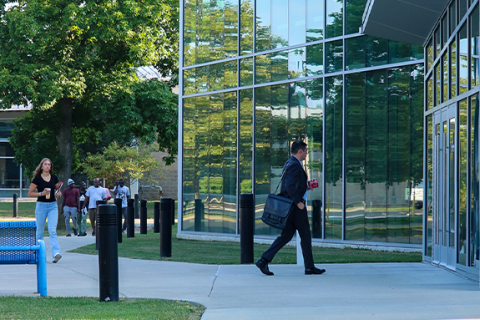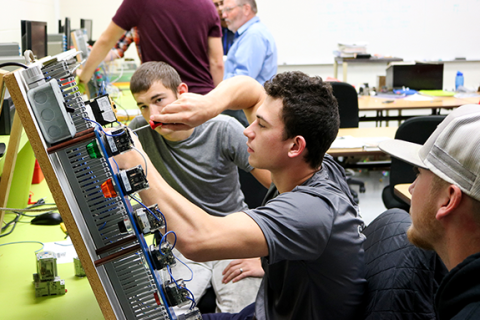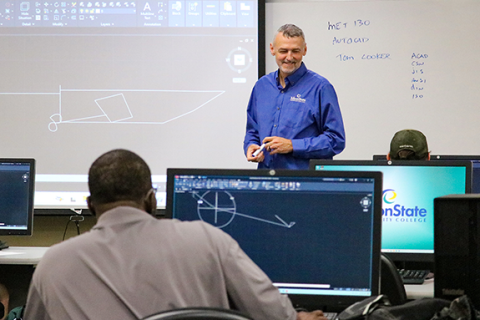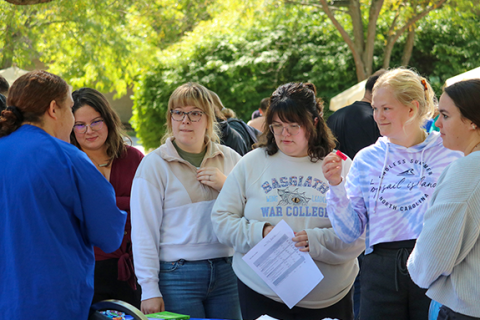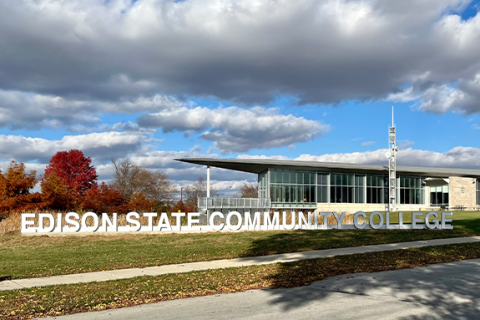
WCOREP
West Central Ohio Regional Education Partnership
- Center For Leadership Development
- Institutional Planning, Effectiveness & Accreditation
- Accreditation & Quality Initiatives
- Assessment of Student Learning
- Institutional Research
- Data Repository
- KPIs
- Fall Semester
- Summer Semester
- Spring Semester
- Student Success Dashboard
- Strategic Plan
- 50Next
- West Central Ohio Regional Education Partnerships
From childhood to workforce.
Empowering All Students with Essential Tools for Academic and Career Success
Serving Darke, Miami, Preble and Shelby Counties
The West Central Ohio Regional Education Partnership is a multiple community organization that will support student career pathways from early childhood through the time they are ready to enter the workforce.

Explore additional information.
Through a 2022 Regional Education Partnership Grant from the Ohio Department of Education, Edison State Community College has formed the West Central Ohio Regional Education Partnership to employ multiple community organizations to support student career pathways from early childhood through the time they are ready to enter the workforce. Beginning in Miami County, key founding partners include Council on Rural Services, Miami County Commissioners, Miami County Educational Services Center, Piqua City Schools, Piqua Compassion Network and Upper Valley Career Center. Edison State Community College serves as the backbone organization utilizing the cradle to career concept and other promising practices for the partnership.
The West Central Ohio Regional Education Partnership seeks to improve access to quality education for all individuals, enhance the quality of education and increase the impact of education on individuals and communities to achieve success and stay in Ohio. Through collaboration and tailored initiatives, we can help build a more equitable and prosperous future for all. This is to be done through increasing educational opportunities, and social and financial resources to support the students and families on their education paths.
IMPACT GOAL To improve access to quality education and increase educational opportunities for students in Miami, Darke, Preble and Shelby counties.
Inputs
- Work with childcare, local schools, and teachers to identify areas for improvement and develop a plan to address them.
- Sub-committees’ partners developing individualized programming and coordination to for activities to achieve final goals of the partnership.
- Developing knowledge transfer models.
- Directing resources towards programming related families, reading, support, technology and teacher-based activities.
- Considerations for new modalities of education work, cooperation and implementation support.
- CAPACITY BUILDING Education partnerships may provide training and support to teachers, education officials and other stakeholders to help them improve the quality of education.
- Raising understanding and awareness of community needs and services provided to bridge the existing gaps and link already existing resources to those who can benefit from them.
- Monitoring and evaluation through data collection and analysis to inform decision-making and measure progress.
Activities
- Partnership with local schools, community, community organizations, and businesses.
- Redirect towards essential resources based upon needs assessments and discussions between collaboration partners.
- Develop and implement a new curriculum that aligns with state standards and addresses the specific needs of the community.
- Collect and analyze data on student achievement, teacher performance and other relevant metrics to inform decision-making and measure progress.
- ADVOCACY AND AWARENESS RAISING Engaging in advocacy and awareness-raising activities to highlight the importance of education and to mobilize support for education initiatives.
- Various activities to be implemented by the founding partners, collaboration partners, and the community at large to ensure achieving a unified vision.
- Focus on improved transport and connectivity services that support mobility and access.
Outputs
- Collaboration network between partners.
- Improved student performance, attendance and engagement in school to reach an overall improvement in test scores.
- Greater community engagement and support for education.
- Programming various activities to support educational milestones.
- Supporting different levels of focus based on the selected milestones of priority.
Outcomes
- Increased access to quality education services for students in the community.
- Improved educational outcomes for students, including KRA, middle grade math and post-secondary completion and enrollment.
- Increased economic opportunities for individuals and the community.
- Improved social and economic mobility for individuals and the community.
Impact
By improving access to quality education and increasing educational outcomes for students in the community, the education partnership will have a positive impact on the long-term success and well-being of individuals and the community. This impact will be seen through increased economic opportunities, improved social and economic mobility and a stronger, more resilient community.
Assumptions
To achieve its goals and outcomes, an education partnership must make the following assumptions:
- EDUCATION IS ESSENTIAL FOR PERSONAL AND PROFESSIONAL SUCCESS The education partnership assumes that education is essential for individuals to succeed in their personal and professional lives.
- COLLABORATION IS KEY TO SUCCESS The education partnership assumes that collaboration between stakeholders in the education sector is necessary to improve the quality and availability of education.
- CONTEXT MATTERS The education partnership assumes that education initiatives must be context-specific and tailored to local needs and circumstances, with more of a holistic approach towards the needs of the community to ensure linking social, health and educational needs networks.
- STARTING SMALL Developing pilot-based concepts to build on and move to the next level of knowledge transfer and wider implementation grounds.
- SUSTAINABILITY IS IMPORTANT The education partnership assumes that education initiatives must be sustainable over the long-term to ensure lasting impact.
- MONITORING AND EVALUATION ARE NECESSARY The education partnership assumes that monitoring and evaluation are necessary to measure the effectiveness of education initiatives and to identify areas for improvement.
Key founding partners of the West Central Ohio Regional Education Partnership include:
Miami County Educational Services Center
To come.
The following resources are currently available.
Additional resources to come.
To come.


